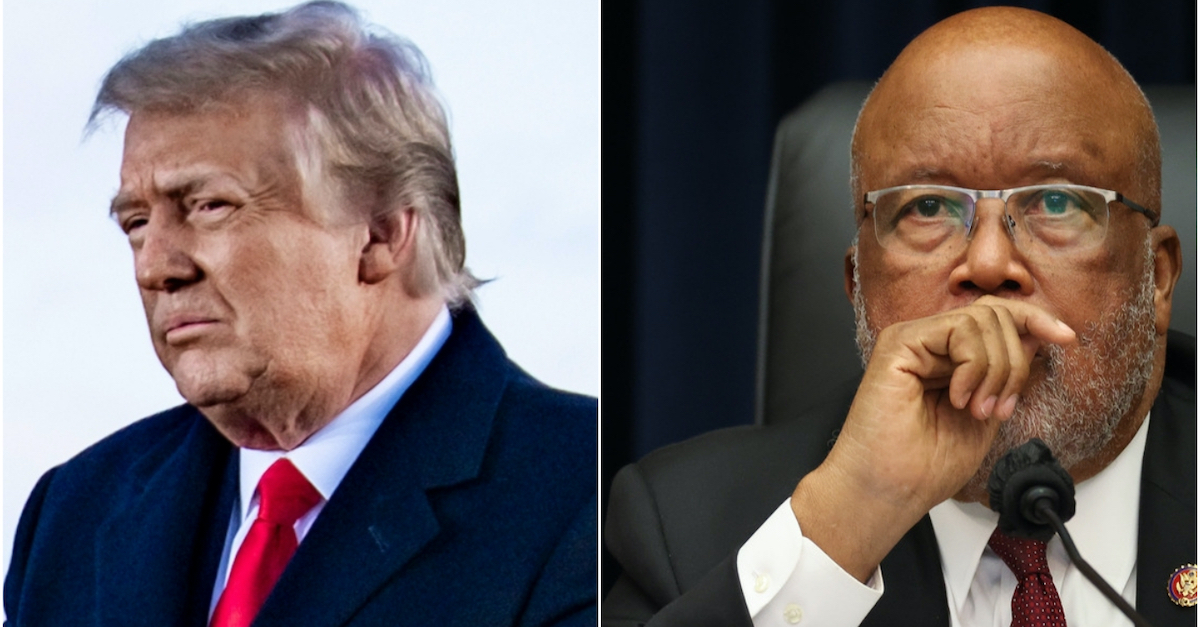
Former President Donald Trump and Rep. Bennie Thompson (D-Miss.), the chair of the Jan. 6th Committee
A federal judge on Thursday skewered former President Donald Trump’s attempt to block the National Archives from complying with the Jan. 6 Committee to Investigate the Attack on the U.S. Capitol by claiming the subpoenas lacked a legislative purpose.
“The Jan. 6 riots happened in the Capitol,” U.S. District Judge Tanya Chutkan told Trump’s lawyer. “That is literally Congress’s house.”
Though the hearing concluded without a ruling, the judge appeared to be deeply skeptical about Trump’s assertion of executive privilege—and concerned about the scope of the requests, some of which she described as “alarmingly” and “unbelievably” broad.
“An Important Argument and a Monumental Argument”
On Oct. 18, Trump sued the Jan. 6th Committee, its chairman Rep. Bennie Thompson (D-Miss), the National Archives and Records Administration, and David Ferriero, asserting that the files sought for the investigation were privileged. The nature of the files that Trump wanted to protect emerged later.
Court filings indicate that Trump asserted executive privilege over 770 pages of documents. Those include 46 pages of records from the files of former chief of staff Mark Meadows, ex-senior adviser Stephen Miller, and ex-deputy counsel Patrick Philbin, the New York Times reported. Trump also reportedly opposed releasing the White House Daily Diary and a call log between him and then-Vice President Mike Pence concerning Jan. 6.
In his opening remarks, Trump’s lawyer Justin Clark emphasized what he characterized as the “monumental” nature of the case, which he called a “case of first impression for this court.” The case asks Judge Chutkan to determine whether a former president can assert privilege for documents over which current President Joe Biden has waived privilege.
“It’s not just an important argument and a monumental argument,” Clark said, but it is one that will have consequences for “generations.”
“Thank you for reminding me of that,” Judge Chutkan remarked, laughing.
The judge quickly took aim at Trump’s reliance on the Supreme Court’s Mazars decision, which established that lower courts must take into account separation of powers concerns implicated by congressional subpoenas when information related to the president is implicated. Much has changed since that July 2020 decision.
Namely, Trump is no longer president.
“An Intrusion by This Branch”
A Barack Obama appointee staunchly critical of Jan. 6 rioters, Chutkan told Trump’s counsel that the Mazars case also involved subpoenas for a then-sitting president’s bank records. By contrast, the Jan. 6 Committee is seeking information about “government activity,” Chutkan noted.
“Isn’t it appropriate that Congress may not know what legislation or how much legislation is required until they complete their fact-finding process?” the judge asked.
Throughout her questioning, Chutkan displayed deep skepticism about Trump’s legal arguments, characterizing them as a request for “unprecedented” intrusion by the judicial branch into two co-equal branches of government.
“Wouldn’t that be an intrusion by this branch into the executive and legislative branch’s function?” she asked.
At one point, Judge Chutkan said that “agrees” that the Jan. 6th Committee appears to have cast a wide net in some instances.
“Some of these requests are alarmingly broad, but some of them are very specific,” she said.
The Department of Justice’s attorney Elizabeth J. Shapiro, arguing for the National Archives, offered another reason why the court should not intervene.
“Presidential communications privilege is a qualified privilege,” Shapiro said.
“These are not documents where privilege and confidentiality will survive forever,” she added. “Far from it.”
“One of the Most Important Congressional Investigations”
The House of Representatives’ lawyer Douglas Letter called the committee’s work “one of the most important congressional investigations in the history of our nation that has ever occurred.”
Interrupting, Judge Chutkan said she had no dispute with that characterization, but she added that some of the committee’s requests are “unbelievably broad,” including a subpoena of all of Trump’s communications with 40 people dating back to April 2020.
“There has to be some limit, don’t you agree?” Chutkin asked.
“Yes, your honor,” Letter agreed.
After that concession, Judge Chutkan queried: “Where is the line drawn?”
Letter argued that it is not up to Trump to make that determination. It is up to the current president: Biden. The committee also seeks polling data to locate the chronological origins of Trump’s plans to sow distrust about the election—and whom the former president targeted, Letter said.
Invoking Watergate with ex-GOP Sen. Howard Baker’s immortal question, Judge Chutkan asked whether the query was: “What did the president know, and when did he know it?”
That was “absolutely” it, Letter replied, urging the judge to rule with “dispatch” because time is of the essence.
Having made strong electoral gains earlier this week, Republicans are likely to disband the committee if they take over the House of Representatives next year. The deadline for the subpoena’s execution is Nov. 12.
[Photo of Trump via Pete Marovich for The New York Times; Photo of Rep. Thompson via Chip Somodevilla/Getty Images]